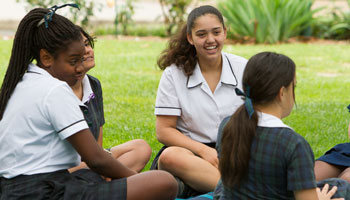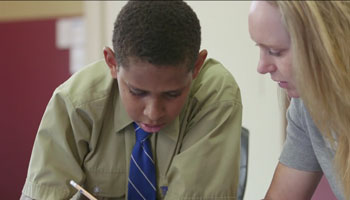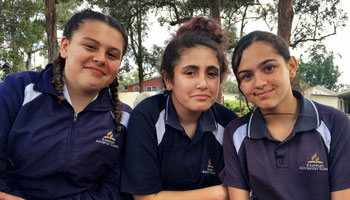An independent evaluation has found that Aboriginal and Torres Strait Islander students improved their academic results under a ground-breaking project created and funded by the Association of Independent Schools of NSW.
AISNSW Chief Executive Dr Geoff Newcombe AM said the Improving Outcomes project lifted students’ literacy levels as well as their confidence, self-management and aspirations for learning.
“Its success was due largely to the 16 participating schools understanding their students’ personal, cultural and learning needs and delivering personalised learning programs to them in a supportive environment.”

Students showed a positive and successful transition into the school and boarding environment.
Dr Newcombe said the key priority of Improving Outcomes was to increase literacy and numeracy among the 649 Aboriginal and Torres Strait Islander students enrolled in participating schools.
“Its success was due largely to the 16 participating schools understanding their students’ personal, cultural and learning needs and delivering personalised learning programs to them in a supportive environment.”
“Each school then tailored its projects to reflect and respond to their unique circumstances and what was most appropriate for their students.”
The project started in 2016 at four NSW urban and regional independent schools with higher than average enrolments of Indigenous students – Kempsey Adventist College, St Joseph’s College at Hunter’s Hill, Pymble Ladies' College and St Ignatius' College, Riverview at Lane Cove.
It was later expanded to 12 more schools with the initial four project schools acting as a ‘hub’, each supporting three ‘spoke’ schools.

Students demonstrated improved literacy, academic results and class rankings.
An evaluation by the Jumbunna Institute for Indigenous Education and Research at the University of Technology Sydney found that the strategies, programs and activities implemented over both phases of the Improving Outcomes project delivered significant results, including:
- improved literacy (particularly reading), academic results and class rankings
- a positive and successful transition into the school and boarding environment
- increased engagement in learning including enhanced motivation and commitment to studies, goal setting, study skills, time management and stress management
- increased aspiration and expectations for further education and employment opportunities
- strengthened connection to and pride in their Indigenous culture and heritage
- improved social, emotional and physical wellbeing.
Dr Newcombe said the evaluation also found the 27 Aboriginal or Torres Strait Islander staff involved in the project were an essential part of its success, as were authentic and strengthened relationships between students, families, communities and schools.

The evaluation showed students' engagement in learning increased.
He said that a critical finding from the project was the need for targeted, individualised learning support and a holistic understanding of students’ needs and capabilities to raising academic outcomes.
A critical finding from the project was the need for targeted, individualised learning support and a holistic understanding of students’ needs and capabilities to raising academic outcomes.
"Before the project started, school staff visited students’ home school, family, and community to increase their awareness and understanding of individual student needs and culture and prior learning. This improved their understanding of students’ learning needs and capabilities.
“Schools were then more able to directly target each student’s academic development while also building strong relationships with their family and community, providing culturally sensitive personal, spiritual, social and physical support.”

The project raised school staff's understanding of individual student needs and culture and prior learning.
Improving Outcomes involved 15 independent schools (12 boarding schools and three day schools) and a government high school. Learnings from the first two phases have refined the design and implementation of the project, which has now been expanded to 25 schools. Learnings from the first two phases have informed the design and implementation of the project. The project has now been expanded to 25 schools with support from the Australian Government’s Choice and Affordability Fund.